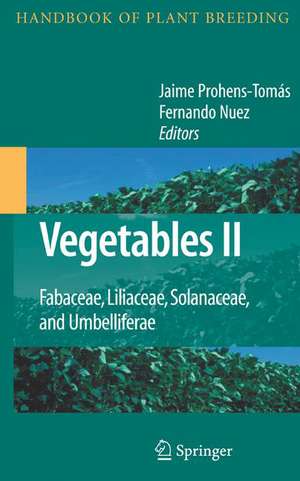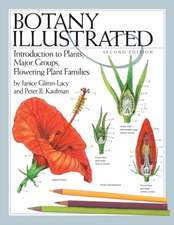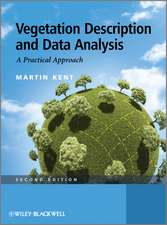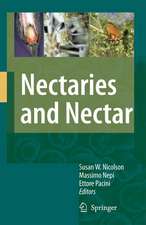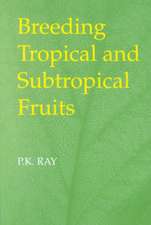Vegetables II: Fabaceae, Liliaceae, Solanaceae, and Umbelliferae: Handbook of Plant Breeding, cartea 2
Editat de Jaime Prohens-Tomás, Fernando Nuezen Limba Engleză Hardback – 17 dec 2007
| Toate formatele și edițiile | Preț | Express |
|---|---|---|
| Paperback (1) | 1820.08 lei 6-8 săpt. | |
| Springer – 31 oct 2014 | 1820.08 lei 6-8 săpt. | |
| Hardback (1) | 1560.63 lei 38-44 zile | |
| Springer – 17 dec 2007 | 1560.63 lei 38-44 zile |
Preț: 1560.63 lei
Preț vechi: 2053.45 lei
-24% Nou
Puncte Express: 2341
Preț estimativ în valută:
298.67€ • 310.66$ • 246.56£
298.67€ • 310.66$ • 246.56£
Carte tipărită la comandă
Livrare economică 10-16 aprilie
Preluare comenzi: 021 569.72.76
Specificații
ISBN-13: 9780387741086
ISBN-10: 0387741089
Pagini: 365
Ilustrații: XI, 365 p.
Dimensiuni: 155 x 235 x 25 mm
Greutate: 0.76 kg
Ediția:2008
Editura: Springer
Colecția Springer
Seria Handbook of Plant Breeding
Locul publicării:New York, NY, United States
ISBN-10: 0387741089
Pagini: 365
Ilustrații: XI, 365 p.
Dimensiuni: 155 x 235 x 25 mm
Greutate: 0.76 kg
Ediția:2008
Editura: Springer
Colecția Springer
Seria Handbook of Plant Breeding
Locul publicării:New York, NY, United States
Public țintă
ResearchCuprins
Family Fabaceae (=Leguminosae).- Garden Pea.- Snap Bean.- Family Liliaceae.- Asparagus.- Onion.- Family Solanaceae.- Eggplant.- Pepper.- Tomato.- Family Umbelliferae (=Apiaceae).- Carrot.
Textul de pe ultima copertă
The production and consumption of vegetables has expanded dramatically in the last years, with a global growth in the production of more than 50% in the last decade and it is expected that in the coming years, vegetable crops production will continue its expansion. The vegetables seed market is very dynamic and competitive, and predominant varieties are quickly replaced by new varieties. Therefore, updated information on the state of the art of the genetic improvement of specific crops is of interest to vegetable crops breeders, researchers and scholars. During the last years an immense quantity of new knowledge on the genetic diversity of vegetables and the utilization of genetic resources, breeding methods and techniques, and on the development and utilization of modern biotechnologies in vegetables crop breeding has accumulated, and there is a need of a major reference work that synthesizes this information.
The Handbook of Plant Breeding—Vegetables I and II are two volumes devoted to 20 of the most important vegetable crops. These crops belong to eight different botanical families grouped by taxonomic category. The first volume focuses on four families: Asteraceae or Compositae (chicory and endive, globe artichoke and cardoon, and lettuce), Brassicaceae or Cruciferae (cabbage, and cauliflower and broccoli), Chenopodiaceae (spinach and sugar beet) and Cucurbitaceae (cucumber, melon, pumpkin and winter squash, summer squash, and watermelon). The second volume concentrates on four other families: Fabaceae or Leguminosae (garden pea, and snap bean), Liliaceae (asparagus, and onion), Solanaceae (eggplant, pepper, and tomato) and Umbelliferae or Apiaceae (carrot).
Chapters have been written by outstanding breeders with wide experience in the crop breeding. Each chapter includes information on the origin and domestication, varietal groups, genetic resources, major breeding achievements and current goals of breeding, breeding methods andtechniques, integration of the new biotechnologies in the breeding programmes, and the production of seed of specific crops.
About the Editors:
Jaime Prohens is president of the European Association for Research on Plant Breeding (EUCARPIA) and vice-president of the Spanish Society for Horticultural Science (SECH). Prof. Prohens teaches Genetics and Plant Breeding at the Universidad Politécnica de Valencia (UPV), Spain. He leads a group on vegetable crops breeding and has published many scientific papers on different aspects related to this subject. Prof. Prohens also serves as member of the editorial board of several scientific journals.
Fernando Nuez is Professor of Genetics and Plant Breeding at the Universidad Politécnica de Valencia (UPV), Spain, and Director of the Institute for Conservation and Improvement of Agrodiversity. Prof. Nuez is author of more than 1000 scientific papers, contributions to congresses and books on plant breeding and has developed several cultivars of vegetable crops. He has been honoured as Honorary member of EUCARPIA for his scientific excellence. He is also director of a Master in Plant Breeding at UPV.
The Handbook of Plant Breeding—Vegetables I and II are two volumes devoted to 20 of the most important vegetable crops. These crops belong to eight different botanical families grouped by taxonomic category. The first volume focuses on four families: Asteraceae or Compositae (chicory and endive, globe artichoke and cardoon, and lettuce), Brassicaceae or Cruciferae (cabbage, and cauliflower and broccoli), Chenopodiaceae (spinach and sugar beet) and Cucurbitaceae (cucumber, melon, pumpkin and winter squash, summer squash, and watermelon). The second volume concentrates on four other families: Fabaceae or Leguminosae (garden pea, and snap bean), Liliaceae (asparagus, and onion), Solanaceae (eggplant, pepper, and tomato) and Umbelliferae or Apiaceae (carrot).
Chapters have been written by outstanding breeders with wide experience in the crop breeding. Each chapter includes information on the origin and domestication, varietal groups, genetic resources, major breeding achievements and current goals of breeding, breeding methods andtechniques, integration of the new biotechnologies in the breeding programmes, and the production of seed of specific crops.
About the Editors:
Jaime Prohens is president of the European Association for Research on Plant Breeding (EUCARPIA) and vice-president of the Spanish Society for Horticultural Science (SECH). Prof. Prohens teaches Genetics and Plant Breeding at the Universidad Politécnica de Valencia (UPV), Spain. He leads a group on vegetable crops breeding and has published many scientific papers on different aspects related to this subject. Prof. Prohens also serves as member of the editorial board of several scientific journals.
Fernando Nuez is Professor of Genetics and Plant Breeding at the Universidad Politécnica de Valencia (UPV), Spain, and Director of the Institute for Conservation and Improvement of Agrodiversity. Prof. Nuez is author of more than 1000 scientific papers, contributions to congresses and books on plant breeding and has developed several cultivars of vegetable crops. He has been honoured as Honorary member of EUCARPIA for his scientific excellence. He is also director of a Master in Plant Breeding at UPV.
Caracteristici
A comprehensive reference on major vegetable crops The only complete resource for plant breeders that includes the most recent molecular techniques being used across species
